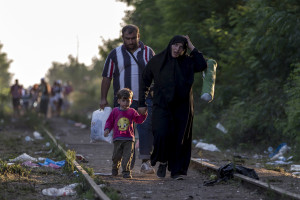EU asylum seeker deal close
The European Union is on the verge of breakthrough in achieving a consensus on the way the bloc approaches the migration crisis that has beset it for half a decade.
The EU has finally launched a drive to overhaul its asylum rules to more fairly share responsibility for an unprecedented influx of migrants despite resistance within the 28-nation bloc.

The European Union is on the verge of breakthrough in achieving a consensus
Its executive body, the European Commission, yesterday unveiled options to reform the rules – two days after Greece began to send migrants back to Turkey under a controversial deal between Brussels and Ankara. The returns have since stalled.
The move came after months of wrangling between EU member nations with several closing their borders and some eastern European states refusing to accept any asylum seekers.
“We need to reform our European asylum system because the present system is not working,” the commission’s first vice-president Frans Timmermans said.
The existing so-called Dublin rules have been criticised as obsolete and unfair to countries like Greece, where most of the 1.25 million Syrian, Iraqi, Afghan and other migrants entered the bloc last year.
Under those rules, migrants seeking asylum must lodge their application in the country where they first arrived, and they should be returned there if they moved on to somewhere else.
But the rules proved unworkable when countries like Italy and Greece, one of the poorest EU members, were overwhelmed by migrants who wanted asylum in Germany and other rich northern EU countries.
“This is neither fair nor sustainable,” Dr Timmermans said, adding that it was a “huge burden” to frontline countries.
Under one reform option, if a member state faces “disproportionate pressure” from migrant arrivals in the future, a “corrective fairness mechanism” can be introduced to redistribute migrants within the bloc.
Reports from Brussels say a majority of countries support this.
But EU states have already struggled to implement an emergency scheme agreed last September to relocate 160,000 asylum seekers out of Greece and Italy. Only 1,100 of them have been resettled so far.
The delays have been pinned on a range of factors, from governments trying to filter out militants from among the refugees following the terror attacks in Brussels and Paris, to a lack of housing and education.
However, some observers say domestic political issues have also played a part.
Under a second, more drastic option, there would be a “permanent distribution key” based on the population and wealth of each member state.
“Responsibility would no longer be linked to the first point of entry,” the commission said.
The reports say the second option is less popular. It is supported mainly by Germany and Sweden, which have already admitted the lion’s share of migrants who did not want to stay in Greece and Italy.
Distribution keys are seen as a veiled quota system which has already been fiercely rejected by member states.
EU Migration Commissioner Dimitris Avramopoulos told the press this week that the options would be discussed with members of the European Parliament and other stakeholders.
The EU and Turkey struck a deal last month under which all “irregular migrants” arriving in Greece after March 20 face being sent back.
On the Greek islands, tensions are running high after the first 202 migrants were sent back to Turkey on Monday. Deportations have stalled since, with thousands of migrants filing last-minute requests for asylum.
Under the “one-for-one” deal with Turkey, for every Syrian returned, another Syrian refugee will be resettled from Turkey in an EU country, with the numbers capped at 72,000. Each case must be examined individually, and an asylum request therefore delays the process.
Laurie Nowell
AMES Australia Senior Journalist












